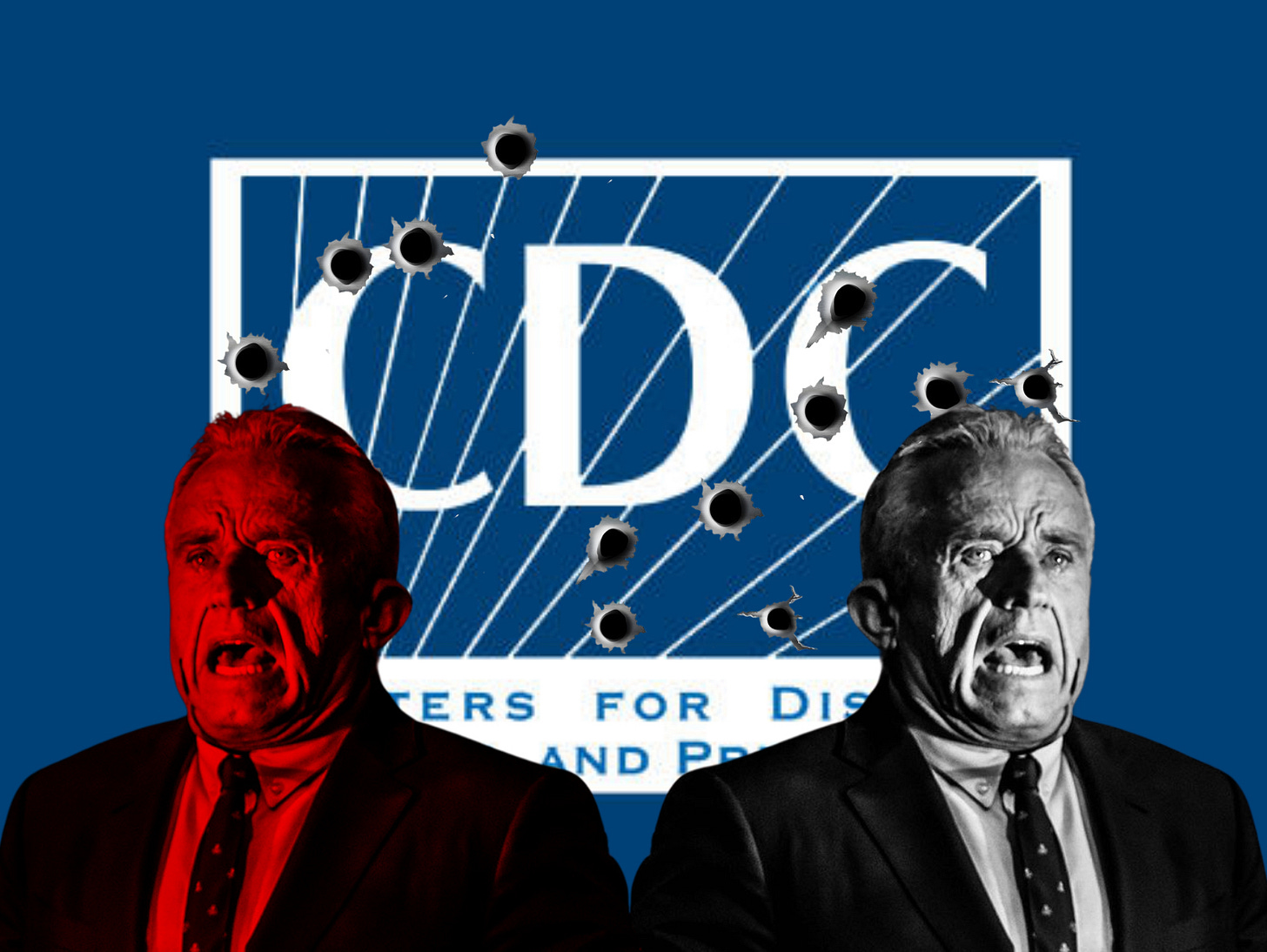HHS Employees Demand Changes From Kennedy, NIH Director Bhattacharya in New Response to CDC Shooting
Hundreds of HHS employees are requesting their leaders stop promoting misinformation and endangering their lives.
This piece has been updated from its email version.
On August 8, a gunman who authorities say believed himself injured by the COVID-19 vaccine fired over 500 rounds in a shooting targeting the Centers for Disease Control and Prevention’s campus in Atlanta that left one responding police officer dead. Now, hundreds of current and former employees of the Department of Health and Human Services are speaking out, demanding changes from Secretary Robert Kennedy Jr., a longtime anti-vaccine activist with a history of spreading misinformation about the agency.
Following the shooting, Kennedy put out a statement, declaring “We know how shaken our public health colleagues feel today. No one should face violence while working to protect the health of others.” Even as he expressed condolences, however, Kennedy criticized the agency’s pandemic response.
On Wednesday, HHS workers pushed back. Kennedy and members of Congress received a formal letter responding to the shooting from hundreds of current and former department employees, accusing the secretary of contributing “to the harassment and violence experienced by CDC staff.” The letter, which is signed by over 750 people, is published on the website saveHHS.org.
The authors and signers make three key requests of Kennedy with a deadline of September 2 to carry out the changes. First, they ask that the secretary stop spreading and publicly disavow inaccurate health information about vaccines, infectious disease transmission, and America’s public health institutions.
Kennedy has spent years misleading Americans about the safety and efficacy of immunizations and modern medicine. He was named as one of the top spreaders of online vaccine misinformation in the Center for Countering Digital Hate’s 2021 report on the “Disinformation Dozen” along with the dark money group he founded, Children’s Health Defense, which paid him handsomely for his advocacy.
The letter’s second ask is for Kennedy to “acknowledge and affirm” the CDC’s scientific integrity—specifically that its “work is rooted in scientific, non-partisan evidence focused on improving the health of every American.”
For years, Kennedy has repeatedly attacked the CDC, suggesting the agency is a “cesspool of corruption” that needs to be ‘cleaned up;’ that its experts have ulterior motives for recommending immunizations; that it is insufficiently protecting Americans and may be withholding important information from them; that it has lied to the people about the safety and efficacy of vaccines; that it has have contempt for the law.
“The CDC recommends THREE Pfizer Covid shots for babies by age 9 months,” Kennedy wrote in a September 2024 post on X, These shots are unsafe and ineffective, especially over the long term. And babies are at near-zero risk from Covid. So whose benefit is the CDC serving here?”
Children’s Health Defense has also sued the agency before to amplify its anti-vaccine claims. As HHS secretary, Kennedy replaced all 17 members of the agency’s Advisory Committee on Immunization Practices with his contrarian and anti-vax allies.
The final request in the letter to Kennedy from HHS employees is simple: Guarantee the safety of the HHS workforce with “emergency procedures and alerts that are fully functional for all workers.” The letter pleads with Kennedy to take “vigorous action to remove high-profile online material targeting the federal workforce such as the widely seen ‘DEI watchlists.’”
”The deliberate destruction of trust in America's public health workforce puts lives at risk,” the letter reads. “We urge you to act in the best interest of the American people—your friends, your families, and yourselves.”
The letter, which concludes by honoring Officer David Rose, the police officer killed in the CDC shooting, for making “the ultimate sacrifice in giving his life to protect others,” includes an addendum by NIH employees to their director. It is the second public letter to Bhattacharya from workers from his agency. In June, hundreds signed “The Bethesda declaration,” accusing him of politicizing the NIH and demanding changes.
“We, the undersigned NIH employees, sign this letter in solidarity with our CDC colleagues,” reads the HHS letter addendum. “We also call on NIH Director, Jayanta Bhattacharya, to refrain from his dangerous politicization of mRNA vaccine technology.”
Bhattacharya, who has cast doubt on the safety and efficacy of the COVID vaccines for years as part of a larger campaign against pandemic control efforts, has long defended Kennedy. In an interview the day after the CDC shooting with far-right conspiracy theorist and former Trump strategist Steve Bannon, the NIH director discussed the secretary’s decision to end mRNA vaccine research. He said the mRNA platform was “no longer viable” for public health due to widespread public mistrust in it. Bhattacharya made his case again in a Washington Post editorial days later.
Like Kennedy, the NIH director has spent years casting doubt on the CDC, claiming, for example, that it—along with NIH and the Food and Drug Administration—had “failed utterly in their management of the pandemic.” He also suggested that it was taking marching orders from the teachers unions.
In a post on X last October, Bhattacharya mocked the agency, calling the popular board game Pandemic “very unrealistic” because “It places the CDC as a hypercompetent globe-spanning, science-focused agency that organizes the worldwide response to four simultaneous pandemics.”
“As a co-op game, groupthink is at the very center of gameplay, so from a public health perspective, I suppose that aspect of the game is realistic,” he wrote. “I would recommend it to anyone who has the stomach to play because lockdowns play no part in the game's permitted pandemic management strategies.”



